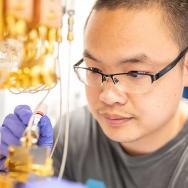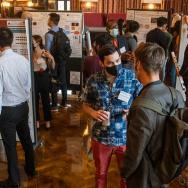The first class of quantum science and engineering Ph.D. students graduated last month from the Pritzker School of Molecular Engineering (PME) at the University of Chicago, representing one of the first cohorts in the nation to complete a Ph.D. dedicated specifically to this rapidly growing field.
The program’s first three graduates are members of the Awschalom Group: Paul Jerger, Erzsebet Vincent and Berk Diler Kovos.
Paul Jerger, PhD’21, researched nitrogen-vacancy centers in diamond, one of the few quantum systems that can be studied at room temperature. He said he was drawn to quantum science by its potential impact on future technology.
“What I find most exciting about quantum computing is that it adds a fundamentally different tool to the toolbox,” he said. “There’s so much happening in computing—artificial intelligence and machine learning—but in some of these cases, we’re hitting the limits of what modern technology can do. Quantum offers a wholly new approach to those processes that can’t be replicated any other way.”
Jerger also spoke about the benefits of working with Argonne National Laboratory and other UChicago partners. Together they make up a robust quantum ecosystem that has helped position the Chicagoland area as a major player in quantum information technologies.
“Working with the people at Argonne has been a big part of my research,” Jerger said. “I’ve benefited from the range of people that I can work with at PME, all of whom have something unique and valuable to add to the grad school experience.”
Jerger will join HRL Laboratories as a scientist later this year, working on their quantum dot research program within the materials and microsystems laboratory.
Erzsebet Vincent, PhD’21, researched the electronic properties of two-dimensional materials while studying as a graduate student at PME. Her work centered on a novel technique called “optical gating,” which uses different colors of light to control electronic properties in those materials. Vincent spoke about her experience at PME and her motivation to join its QSE program.
“I was drawn to PME by its interdisciplinarity,” Vincent said. “PME brings together people from diverse scientific backgrounds and creates an environment where they can cultivate their work side-by-side. The school encourages communication and collaboration across topics, which opens the doors for a lot of exciting innovation.”
Vincent plans to remain in academic research, focusing on quantum biology.
“I am particularly interested in quantum sensing in biological systems, where the environmentally responsive properties of quantum systems are harnessed in order to make extremely sensitive nanoscale measurements,” Vincent said. “I think seeing the unusual properties of quantum mechanics peeking through the science of life is very exciting, and that utilizing quantum sensing opens the door to new precision and better understanding of biology. I believe this field overall offers the potential for groundbreaking fundamental research as well as novel technologies.”
Berk Diler Kovos, PhD’21, focused his graduate research on developing quantum bits using transition metal ions. Quantum bits, or qubits, serve as the backbone for quantum devices such as communication nodes, sensors, and computers, much in the same way that transistors function in a conventional computer. His work looked at creating and characterizing this highly scalable qubit platform. For him, quantum science has been a way to better understand and engineer the world we live in.
“Quantum mechanics, essentially, is the fundamental law that nature runs on,” Kovos said. “Understanding it is the key to understanding the rules of the game—of this universe that we are in. Then being able to use those laws to build technology, and build something useful to humanity, is also very enticing and exciting.”
Kovos, who will continue working in the Awschalom Group as a postdoctoral scholar, also spoke about PME’s distinctive working environment and how it influenced his work.
“One of the main reasons that I decided to continue as a postdoc at PME is that the people here are amazing,” he said. “There’s a spirit of collaboration and camaraderie here, this dynamic that you can go to anyone and ask questions and have a chat, and that opens up your perspective. Everybody’s always willing to help. And that’s just incredible.”
PME has emphasized quantum training and education since the inception of its first doctoral program, the Molecular Engineering Ph.D., in 2013, which included a comprehensive quantum science and engineering specialty. Then in November 2021, PME launched its Quantum Science and Engineering Ph.D. program, elevating that specialty and creating one of the first programs of its kind in the nation.
“As an institution, PME dedicates itself to fields that will drive the next generation of technology and innovation,” said Matthew Tirrell, dean of PME. “Quantum science and engineering is one that has the potential to transform multiple industries, which is why we have gathered some of the field’s best minds to train the world’s future quantum leaders. This first class of graduates represents the very forefront of quantum science education. I look forward to seeing what they will achieve.”
“By attracting outstanding researchers and cultivating interdisciplinary research, we’ve worked for nearly a decade to create one of the strongest academic programs in the nation,” said David Awschalom, Liew Family Professor of Molecular Engineering and director of Q-NEXT, a Department of Energy quantum information science research center. “As the field of quantum technology grows and expands, degree programs like this one will be key to developing a diverse and talented workforce of quantum engineers, shaping the future of the field for years to come.”
QSE’s initial cohort will be invited to attend UChicago’s 2022 convocation, held in June.
“We’re extremely proud of the high caliber of this first group of graduates,” said Aashish Clerk, professor of molecular engineering and director of graduate studies for the QSE program. “We are confident that they will continue to play key roles in advancing the state of the art in quantum engineering, helping this field achieve its full potential.”
—This story was first published by the Pritzker School of Molecular Engineering

